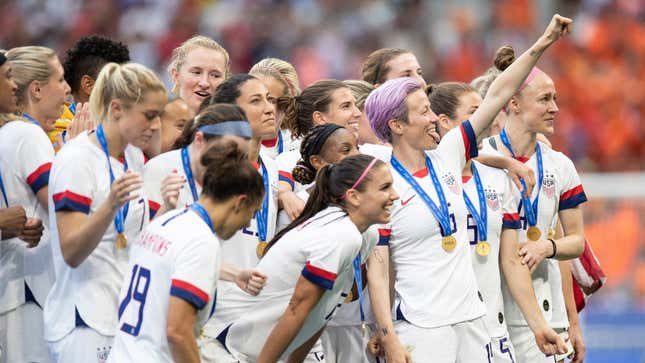The Problem With 'Pay Them'
Latest

The U.S. Women’s National Team winning the World Cup was bound to represent something much bigger than soccer. As the team progressed through the tournament, players and journalists have reminded audiences that between 2016 and 2018, women’s games generated more income for FIFA than the men’s games—despite the fact that the women’s team earned less then the men’s team. It was a fact that seemed to highlight the very unfairness of the pay disparity. Their success also pointed attention to a lawsuit, filed in March, by members of the team against the United States Soccer Federation (USSF) alleging pay discrimination.
Immediately following their win, FIFA president Gianni Infantino and French president Emmanuel Macron handed Megan Rapinoe the Golden Boot award. As they posted center field, a cheer overcame the stadium: “Equal pay! Equal pay! Equal pay!”
If “performance” becomes the arbiter of what fair wages look like worldwide, it creates a troubling model based on the idea of “excellence.”
The team’s World Cup win has launched a national discussion of equal pay with celebrities, athletes, and politicians joining the fray. (Celebrants range from former president Barack Obama to Nicole Kidman’s husband Keith Urban to tennis legends Billie Jean King and Serena Williams to current presidential nominee Elizabeth Warren.) It’s also become a touchstone on Twitter, with many blue-checked cultural tastemakers rallying around the unfairness of the team’s low pay coupled with their historic success. Even the arbiters of the national attention, The View co-hosts, rallied around their fight for equal pay on Monday’s program.
But my opinions are conflicted on where this conversation moves from here. Celebrating women’s achievement is essential to pushing the fight for equitable workplaces forward—and it was a revelation to see a six lesbians lead the team to victory, in a Pride month besieged by corporate greed nonetheless. Yet their win casts a light on our nation’s troubling habit of looking towards a privileged few—people like athletes and celebrities—to lead conversations on pay. Movements like Time’s Up and the fight against the wage gap posit that stellar performance (with positive financial results) demands equal compensation. It’s a familiar story: “I work harder than my male counterparts and still get paid half as much.”
However, if “performance” becomes the arbiter of what fair wages look like worldwide, it creates a troubling model based on the idea of “excellence.” It feels unjust that Rapinoe and her teammates are paid less than her underperforming colleagues. But would we still be having these conversations if they hadn’t made the finals? Excellence won’t always be on the table as a bargaining tool, and applied to workplaces across America fighting for equitable wages and working conditions, I only foresee a losing battle. In a factory job, for instance, many women work long hours in brutal conditions while companies like Amazon demand efficiency and high “performance.” To draw attention to these business practices and demand more equitable working conditions, workers in Wisconsin are planning a national strike. Here, the excellence model of bargaining that we’ve put on the soccer players would grossly underserve the much more vulnerable warehouse employee.
Rapinoe herself used her post-game conference to dismiss the simplification of the issue.
“I think we’re done with: ‘Are we worth it, should we have equal pay, is the market the same?’ Yada yada. Everyone’s done with that; fans are done with that, players are done with that. In a lot of ways I think sponsors are done with that. Let’s get to the next point. What’s next? How do we support women’s federations and women’s programmes around the world? What can Fifa do to do that? What can we do to support the leagues around the world?”
Let’s get to the point, indeed.